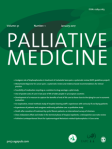Professor Gerhild Becker, Chair of the Department of Palliative Care, University Medical Center Freiburg, Germany, explains the background to the longer article selected as ‘Editor’s choice’ in the January issue 2017 of Palliative Medicine.
The impulse for our study was a conversation between a patient and a cleaning woman. It’s a pleasure to talk to this lady, the patient told us during the ward round. She knows about life and she understands about listening.
Thus, the idea for a study arose.
Caring for seriously ill patients and especially those receiving palliative care advocates a multidisciplinary team approach. Not only are physicians and nursing staff confronted with the challenge of caring for dying patients, other hospital staff members also have frequent patient contact and feel a commitment to care for and comfort dying patients and their families.
But, what is the role of cleaning staff on a hospital ward apart from cleaning rooms? Research on this topic is lacking. How may cleaning stuff help to improve the overall care of patients? Are they providing something like ‘low-threshold soul care’ as a side effect of their job? And, if so, how do they manage it? How do they cope? Are they aware of their role?
To answer these questions we chose a sequential mixed methods design. At our University Medical Center in Southern Germany, we recruited cleaning staff and also cleaning management staff for interviews and focus group discussions. Interviews and focus group discussions were content analyzed and results were used to create a questionnaire which was given to all cleaning staff (n=240) working at our clinic.
In interviews and focus group discussions, cleaning staff described interactions with patients as an important and fulfilling aspect of their work. In total, 124 questionnaires were returned. About half of participants indicated that patients talk with them every day, on average for one to three minutes. Although the most common topics of conversation include small talk such as weather and family, patients also discussed their illness and, occasionally, thoughts regarding death. When patients addressed illness and death, cleaning staff often felt uncomfortable and helpless.
Results of our study showed that cleaning staff perceive that they have an important role in the clinic – not only to clean but also to support patients. Serious illness frightens patients and isolates them from their support communities when they need them most. Likewise, patients seem to appreciate being able to speak openly with cleaning staff. Yet, it appears that cleaning staff may benefit from additional training in how to communicate with patients about sensitive issues such as illness.
We hope that this research may help to make us all more aware that caring for seriously ill and dying patients is a challenge for various occupational groups within the hospital setting, who come into contact with dying patients during their day-to-day work.
 Read the full article in Palliative Medicine
Read the full article in Palliative Medicine
This blog post relates to the longer article, ‘Tidying Rooms and Tending Hearts: An Explorative, Mixed-Methods Study of Hospital Cleaning Staff’s Experiences with Seriously Ill and Dying Patients’ by Karin Jors, Svenja Tietgen, Carola Xander, Felix Momm and Gerhild Becker, published in Palliative Medicine 2017, Vol. 31(1) 63–71. First published online: May 9, 2016. Article first published online: May 9, 2016; DOI: 10.1177/0269216316648071.
EAPC MEMBERS – DOWNLOAD THIS, AND ALL OTHER ‘EDITOR’S CHOICE’ ARTICLES, FREE OF CHARGE
If you are currently an Individual or Associate EAPC Member you have full access to the Members Only Area of the EAPC website, and the chance to download a free PDF of all ‘Editor’s choice’ articles and many other papers too. Just click here, enter your email address and membership password and choose from the list of journal articles.
How to join as an Individual/Associate Member, or to renew your membership
- Individual members are invited to join the EAPC or renew their membership here.
- Associate Members – all current members of our National Associations are invited to join the EAPC or renew their membership for FREE. Click here.
Read earlier Editor’s Choice posts on the EAPC Blog


Pingback: Cleaning hearts to talk about spiritual care – Palliative Care NSW Volunteer Support Services Programme